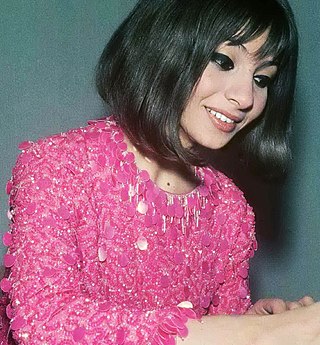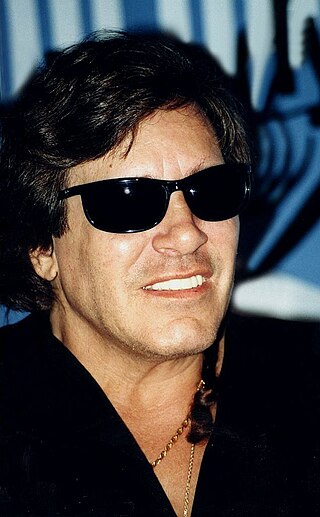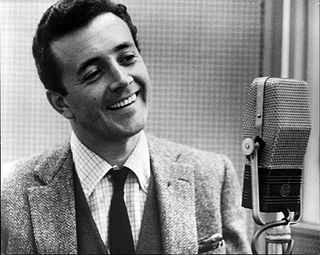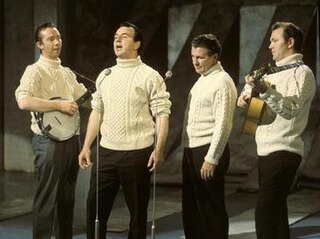Related Research Articles

The Seekers were an Australian folk-influenced pop group originally formed in Melbourne in 1962. They were the first Australian pop music group to achieve major chart and sales success in the United Kingdom and the United States. They were especially popular during the 1960s, with their best-known configuration of Judith Durham on vocals, piano and tambourine; Athol Guy on double bass and vocals; Keith Potger on twelve-string guitar, banjo and vocals; and Bruce Woodley on guitar, mandolin, banjo and vocals.

Henry John Deutschendorf Jr., known professionally as John Denver, was an American singer and songwriter. He was one of the most popular acoustic artists of the 1970s and one of the best-selling artists in that decade. AllMusic has called Denver "among the most beloved entertainers of his era".

Esther Zaied, better known by her married name Esther Ofarim, is an Israeli singer. She came second in the 1963 Eurovision Song Contest with the song "T'en va pas", representing Switzerland. After marrying Abi Ofarim in 1958, she was half of the husband-and-wife folk duo Esther & Abi Ofarim in the 1960s. After the couple divorced, she undertook a successful solo career.

José Montserrate Feliciano García is a Puerto Rican musician. He recorded many international hits, including his rendition of the Doors' "Light My Fire" and his self-penned Christmas song "Feliz Navidad". Music genres he explores consist of fusion of many styles, such as Latin, blues, jazz, soul and rock music, created primarily with the help of his signature acoustic guitar sound.

The Nitty Gritty Dirt Band (NGDB) is an American country rock band formed in 1966. The group has existed in various forms since its founding in Long Beach, California. Between 1976 and 1981, the band performed and recorded as the Dirt Band.

Vic Damone was an American traditional pop and big band singer and actor. He was best known for his performances of songs such as the number one hit "You're Breaking My Heart", and other hits like "On the Street Where You Live" and "I Have But One Heart".

The Clancy Brothers were an influential Irish folk music group that developed initially as a part of the American folk music revival. Most popular during the 1960s, they were famed for their Aran jumpers and are widely credited with popularising Irish traditional music in the United States and revitalising it in Ireland, contributing to an Irish folk boom with groups like the Dubliners and the Wolfe Tones.

The Irish Rovers is a group of Irish musicians that formed in Toronto, Canada in 1963 and named after the traditional song "The Irish Rover". They are best known for their international television series, contributing to the popularization of Irish Music in North America, and for the songs "The Unicorn", "Drunken Sailor", "Wasn't That a Party", "The Orange and the Green", "Whiskey on a Sunday", "Lily the Pink", "Finnegan's Wake" and "The Black Velvet Band".
The Barron Knights are a British humorous pop rock group, originally formed in 1959 in Leighton Buzzard, Bedfordshire, as the Knights of the Round Table.

Jane Morgan is an American former singer and recording artist of traditional pop. Morgan initially found success in France and the UK before achieving recognition in the US, receiving six gold records. She was a frequent nightclub and Broadway performer, and also appeared numerous times on American television, both as a singer and as a dramatic performer.

The New Christy Minstrels are an American large-ensemble folk music group founded by Randy Sparks in 1961. The group has recorded more than 20 albums and scored several hits, including "Green, Green", "Saturday Night", "Today", "Denver" and "This Land Is Your Land". The group's 1962 debut album, Presenting the New Christy Minstrels, won a Grammy Award and remained on the Billboard 200 albums chart for two years.

Michael Valentine Doonican was an Irish singer of traditional pop, easy listening and novelty songs, who was noted for his warm and relaxed vocal style.

"People" is a song composed by Jule Styne with lyrics by Bob Merrill for the 1964 Broadway musical Funny Girl starring Barbra Streisand, who introduced the song. The song was released as a single in 1964 with "I Am Woman", a solo version of "You Are Woman, I Am Man", also from Funny Girl.
"Cotton Fields (The Cotton Song)" (also known as In Them Old Cotton Fields Back Home) is a song written by American blues musician Huddie Ledbetter, better known as Lead Belly, who made the first recording of the song in 1940.

Anita Jean Kerr was an American singer, arranger, composer, conductor, pianist, and music producer. She recorded and performed with her vocal harmony groups in Nashville, Los Angeles, and Europe.
The Ian Campbell Folk Group were one of the most popular and respected folk groups of the British folk revival of the 1960s. The group made many appearances on radio, television, and at national and international venues and festivals. They performed a mixture of British traditional folk music and new material, including compositions by Campbell. Much of their popularity flowed from the variety of their performance which included a mixture of solos, group vocals and instrumentals.
"Beans in My Ears" is a song written by Len Chandler that was a hit single in 1964 when covered by The Serendipity Singers.

John Joseph Maus, known professionally as John Walker, was an American singer, songwriter and guitarist, best known as the founder of the Walker Brothers, who had their greatest success in the 1960s, particularly in the United Kingdom.
"Don't Let the Rain Come Down " was a folk music single, and the debut recording of the Serendipity Singers in 1964. The song was based on the English nursery rhyme "There Was a Crooked Man".
The Au Go Go Singers were a nine-member folk group formed in New York City in 1964, and best remembered for featuring Stephen Stills and Richie Furay two years before they formed Buffalo Springfield.
References
- ↑ Brio, Nick. "Serendipity Means Newness, Happiness, 7 Boys, 2 Girls, Nylon Strings and Success. Billboard, 25 April 1964, p. 10 ("Record Preview"section).
- ↑ Brown. G. Colorado Rocks: A Half-Century of Music in Colorado. Boulder, CO: Pruett Publishing, 2004
- ↑ Maher, Jack. "Bitter End (Talent): Here's Lucky Find for Anybody." Billboard, 23 November 1963, p. 16
- 1 2 3 4 Billboard, Allmusic.com
- ↑ Brown, G. "Colorado Rocks: A Half-Century of Music in Colorado. Boulder, CO.: Pruett Publishing, 2004.
- ↑ Boulware, Hugh. "Serendipity`s There Despite New Faces." Chicago Tribune, 3 November 1988."
- ↑ Larson, John. "Diversity Brings Success for Serendipity Singers." Zanesville Times Register, 25 July 1965, p. 3.
- 1 2 3 Hatch
- ↑ Johnson, Ronald. North Florida Folk Music: History & Tradition. Charleston, SC: The History Press.
- ↑ Ochs, Ed. "Serendipitys Now Rockendipitys." Billboard, 13 April 1968, p. 16.
- ↑ "Serendipitys in 4 TV Shows." Billboard, 4 May 1968, p. 16.
- ↑ Weir, Stan. "Serendipity Singers in Concert at Dodge." Hutchinson News, 18 April 1969.
- ↑ McDonough, Jack. "Serendipity Singers Booked for 5 Television Specials." Billboard, 3 August 1974, p. 51.
- ↑ Kornheiser, Tony. "On the Road Again -- and Again With the Once and Future Stars." Washington Post, 17 December 1980, p. E1.
- ↑ "Yahoo TV". Tv.yahoo.com. 2015-01-04. Retrieved 2015-07-12.
- ↑ "A Serendipitous Reunion". Broadwaytovegas.com. July 25, 1999. Retrieved 2012-10-08.
- ↑ Muir, John. K. Best in Show: The Films of Christopher Guest and Company. NY: Applause Theatre & Cinema Books, 2004: p. 181.
- ↑ "WQED Multimedia: Station Relations". Wqed.org. Retrieved 2015-07-12.
- ↑ Hicks, L. Wayne. "Colorado Music Hall of Fame moving to Red Rocks. Denver Business Journal, 8 November 2013.
- ↑ Marchese, Joe (2013-09-12). "Pure Serendipity: Now Sounds Uncovers Serendipity Singers' Psych-Pop Treasure". The Second Disc. Retrieved 2015-07-12.
- ↑ "CHUM Hit Parade - April 27, 1964".